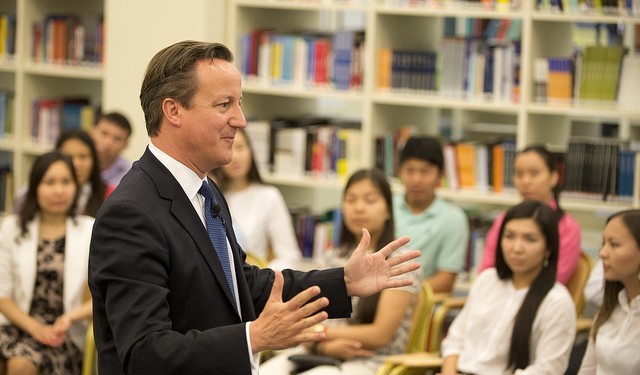In a spectacular leak that backs the claim made of a UK government split on how to handle UK education exports, a memo has come to light that reveals UK PM David Cameron is keen to develop an industrial strategy around education exports, which could include universities actively helping their international graduates to find a UK job; swifter routes to citizenship for some; smoother visa processing for UK alumni; more foreign universities in the UK and extending access to the secondary school system to internationals.
News and business analysis for Professionals in International Education
Have some pie!
UK: Prime Minister in doubt over student policy
 The Prime Minister, who was promoting education links with Kazakhstan this week, says Britain should ease some visa rules. (Photo courtesy of the Prime Minister's Office)
The Prime Minister, who was promoting education links with Kazakhstan this week, says Britain should ease some visa rules. (Photo courtesy of the Prime Minister's Office) A letter from the PM’s private secretary tells government departments to work harder to attract the “brightest and best” international students amid fears that unpopular policies are putting them off, a memo leaked to The Times reveals.
The PM’s office asks the Department for Business, Innovation and Skills (BIS) to incorporate new ways of attracting international students into its new Education Exports Industrial Strategy, warning that “if we are to win the global race, the UK needs to attract the most talented people”.
A range of suggestions presented include a two-year short-cut to citizenship for PhD students in STEM subjects (from five to three years), ensuring the input of “emerging powers” such as Brazil, India and China on the new Education Exports Council and allowing international students to attend state secondary schools for the first time, mirroring a policy already employed successfully in other countries such as Canada (its secondary system hosted 35,000 in 2010).
“At the same time we need to pitch our offer to international students more persuasively”
The suggestions follow sector uproar over Home Office proposals last week to extend a bond scheme for “high risk” visitors to all visa routes (taken to mean students too), as well as a subsequent Department of Health plan to charge international students to use Britain’s health service.
Clearly seeking to stem the opprobrium, the memo states: “We need to make clear that there is no limit on the students who can come here and we should showcase the many options that remain available to students to remain in the UK after their studies. But at the same time we need to pitch our offer to international students more persuasively.”
It suggests universities should “take ownership” of students who plan to stay in the UK to help them find a job paying £20,000 a year (the required threshold) before they graduate — a nod to the post-study work visa scrapped last April, which is widely blamed for a fall in Indian university applications.
The memo also asks BIS to encourage universities to make more of the Tier 1 Exceptionally Talent visa route offering leave to remain – for example the top 1,000 achievers at university or across STEM subjects.
“You should consider with the Home Office options for reducing administration burdens such as the number of applications that a single student is required to make,” it adds.
The PM also proposes allowing international students to attend state academies and free schools
In another radical proposal, the Prime Minister calls on BIS to work with the Department of Education to allow international students to attend academies and free schools (secondary schools funded by central rather than local government). While free schools are a relatively new concept, more than half of secondary schools are now academies and the government wants all schools to convert.
While controversial – the UK faces a shortfall of 100,000 school places – the move would offer a clear export opportunity. The Times quotes a Whitehall insider as saying, “The idea that international pupils would attend British state schools for free is a non starter.”
On the UK’s education technology offer, further support for this sector such as British-delivered MOOCs is also counselled.
The memo supports claims that the government is divided over its student immigration policy. Last week the vice chancellor of the University of Exeter, Steve Smith, told The PIE that both the Prime Minister and universities minister David Willetts (part of BIS), privately disagreed with including students in net migration figures.
BIS also declined to offer an opinion when asked whether it supported the Home Office’s desire to extend cash bonds to “all visa routes”. “What has been announced in relation to bonds is a pilot scheme which would only affect a small number of the highest risk visitors,” a spokesperson said. “The pilot will be evaluated and assessed before any decisions are made about other visa routes.”
Still looking? Find by category:



Hello:
The antiquated U.K. system is indeed in dire need of an overhaul. Having taught there for a bit, I agree that it is not friendly to international students or professionals. If England wants to keep its place in the world arena, it needs to attract top talent from all over the globe like other countries. I do not believe that any country can long survive trying to do everything solely internally. “Home grown” is usually synonymous with stagnant.